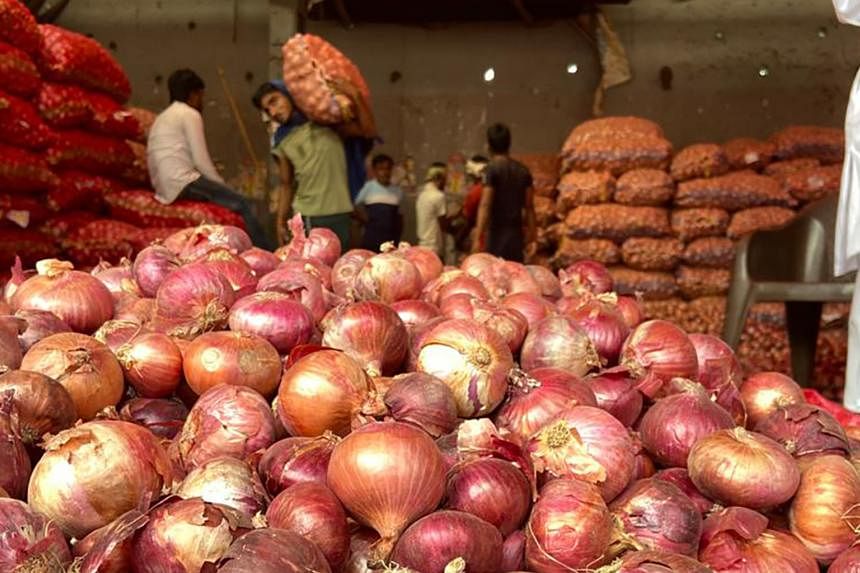NEW DELHI - The Indian government has banned onion exports till March 2024 and lifted import duties on yellow peas as it tries to bring down food prices, a hot-button issue that could hurt the re-election campaign of Prime Minister Narendra Modi.
These moves follow its restrictions on the export of sugar and rice earlier in 2023.
Analysts said that the series of food export bans and exemptions rolled out by India, while having global reverberations, would continue until the general election, which is due by May 2024.
“Notably, inflation in key items within the food basket, such as pulses, cereals and spices, has persistently remained in double digits in recent months. The recent surge in prices of sugar and vegetables is a source of apprehension,” said Mr Sarbartho Mukherjee, senior economist at credit rating agency CareEdge.
He said that regulating prices of food items ahead of the general election remained a key “imperative”.
Inflation, led by high food prices, rose to a three-month high of 5.55 per cent in November.
The onion ban comes after the government in August slapped a 40 per cent export duty on onions to prevent prices spiking beyond 50 rupees (80 Singapore cents) a kilogram in the wholesale market.
In December, the food staple – the sowing of which was disrupted by late and low rainfall in areas where onions are grown – saw prices touch 45 rupees a kilogram in the wholesale market, prompting the outright ban.
Onions, in particular, have been known to exact a punishing political toll.
In 1998, the Delhi state government run by the Bharatiya Janata Party was voted out because state elections coincided with a rise in onion prices.
The December 2023 onion ban, like earlier export restrictions on rice and sugar, also impacted countries outside of India, the second-largest producer of onions, with prices doubling in the immediate aftermath of the ban in Bangladesh, local media reported.
Other neighbouring countries like Nepal, Bhutan, Sri Lanka and the Maldives also saw rising prices.
Malaysia’s Agriculture and Food Security Minister Mohamad Sabu said the country would source onions from China and Pakistan to make up for India’s ban, while Nepal has said it will ask India to make an exemption and continue onion exports.
The Singapore Food Agency (SFA) said in an e-mail response on Dec 18 that there was no onion shortage in Singapore despite India’s ban. “There is adequate supply of onions to date,” said the SFA, noting that onions are imported from 20 countries and regions such as Malaysia, China, India and Australia.
The agency, however, noted that food disruptions would continue and urged consumers to be “flexible and adaptable in their food choices, such as by switching to alternative food types or varieties of vegetables in the event of a disruption”.
“Global supplies will continue to face uncertainties and food supply disruptions may occur from time to time. While the Government will do what we can to minimise the impact, we will not be able to completely mitigate disruptions to our food supply,” the SFA said.
In India, the yield for farm crops in 2023 has been impacted by the driest August since 1901, with delayed and uneven monsoon rains cutting production of commodities from rice to sugar and wheat.
As a result, India, the world’s largest exporter of rice, banned the export of broken and non-basmati white rice varieties in July, in a decision the United Nations Food and Agriculture Organisation said pushed up global rice prices to their highest levels in 15 years.
Indian rice production is estimated by the agriculture ministry to fall by 3.79 per cent to 106.31 million tonnes in 2023.
The government has also extended an earlier ban on sugar exports from October 2023 to September 2024. It will allow the export of only 6.1 million tonnes of sugar, which is almost half that of 2022, during this period.
Economists expect this food price volatility to continue in the coming months due to lower water reservoir levels and delayed sowing of crops like onions.
Mr Mukherjee noted that the volatility in food prices remained a primary challenge to the Reserve Bank of India’s efforts to curb headline inflation and maintain it close to the 4 per cent target.
Inflation hit 6 per cent in the second quarter of the financial year ending March 31, 2024.
Analysts underlined how the government needed to look beyond bans to other solutions to insulate the country from food production disruptions caused by the weather.
“A durable solution to this is better storage and food processing. In the absence of such provisions, a hit to production quickly translates into price spikes, and the government has often had to resort to export bans and imports to stem those,” said Mr Dharmakirti Joshi, chief economist at CRISIL, a global analytics company.
With elections around the corner, political considerations are seen to outweigh all other obligations as Mr Modi seeks not just a third term in power but also a majority government like his previous two terms.
Mr Modi, according to opinion polls, is comfortably placed as the leading contender in the 2024 general election.
Professor Biswajit Dhar, a distinguished professor at the Council for Social Development, a research and advocacy institution, said that food inflation had not yet become a political issue, but added that the challenge would be at the beginning of 2024 when prices of vegetables usually spike ahead of the arrival of fresh stock.
“The government doesn’t want food price inflation to become a political issue,” he said.
“Exports can wait and India’s promise to feed the world can wait. First is political expediency.”


